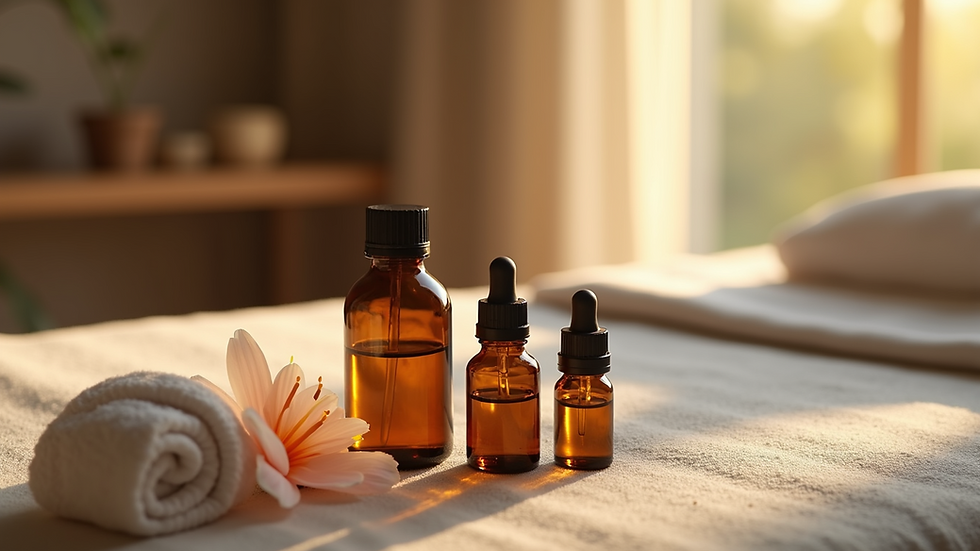Unlocking Emotional Balance: The Profound Impact of Massage Therapy on Emotional Regulation
- attentivetherapy
- May 29, 2025
- 4 min read
In today's fast-paced world, managing emotions can feel like a daunting task. The constant demands of work, family, and social obligations can lead to heightened stress and anxiety. However, one effective way to restore emotional balance is through massage therapy. This post explores the invaluable role that massage can play in enhancing emotional regulation, providing insights into its physiological, psychological, and social benefits.
Understanding Emotional Regulation
Emotional regulation is the ability to identify, understand, and manage one's emotional experiences effectively. This encompasses both conscious and unconscious processes that help individuals adjust their emotional responses to different situations.
The advantages of emotional regulation extend well beyond improved mood. Studies show that individuals with strong emotional regulation skills enjoy stronger relationships, make better decisions, and experience overall improved mental health. Learning how to regulate emotions is essential for achieving a fulfilling and balanced life.
The Connection Between Massage Therapy and Emotional Well-Being
Massage therapy, often seen as a luxury, provides significant emotional benefits. By manipulating soft tissues in the body, massage can reduce muscle tension and promote relaxation.
Research indicates that receiving massages can lower stress hormones, such as cortisol, by up to 30%. At the same time, it can elevate serotonin and dopamine levels, which play crucial roles in regulating mood. This chemical balance can lead to noticeable improvements in emotional well-being, making massage therapy an effective tool for emotional regulation.
Physiological Effects of Massage on Emotions
Release of Endorphins
Endorphins are the body’s natural pain relievers, and massage can trigger their release. An increase in endorphins has been linked to feelings of happiness and emotional stability, which means that a good massage can leave you feeling uplifted.
Reduction of Muscle Tension
Chronic muscle tension often correlates with stress and anxiety. Studies show that regular massage can reduce muscle soreness by up to 70%, promoting a sense of relaxation that ultimately supports emotional health.
Improved Circulation
The boost in blood flow from a massage helps distribute essential nutrients and oxygen to muscles and organs. Enhanced circulation helps the body manage stressors more effectively, contributing to improved emotional resilience.
Activation of the Parasympathetic Nervous System
Massage stimulates the parasympathetic nervous system, which is responsible for relaxation. This activation can lower heart rates and blood pressure, creating an environment conducive to emotional calmness.
Psychological Impact of Massage Therapy
Stress Reduction
Engaging in massage therapy provides a mental reset. Individuals often report feeling less stressed right after a session, allowing them to think more clearly and approach problems with a calmer mindset.
Enhancement of Self-Perception
Consistent massage encourages greater body awareness and self-love. According to surveys, 85% of participants who received massages regularly reported feeling more in tune with their bodies, leading to better emotional control.
Promotion of Mindfulness
The act of receiving a massage encourages mindfulness, allowing individuals to focus on the present moment. This heightened awareness helps in recognizing and processing emotions before they escalate.
Reduction of Symptoms Associated with Anxiety and Depression
Evidence shows that massage therapy can significantly alleviate symptoms of anxiety and depression, reducing anxiety scores in individuals by up to 50% after regular sessions.
The Role of Touch in Emotional Regulation
Touch is a core human need that plays a crucial role in emotional health. The therapeutic touch from massages functions as a powerful form of non-verbal communication that fosters connection and support.
This contact can lead to a surge in oxytocin, known as the "love hormone," which encourages trust and bonding. This feeling of safety allows individuals to explore and understand their emotions more deeply.
The Social Benefits of Massage Therapy
Community and Connection
Many massage sessions occur in communal environments, providing a sense of belonging. Being surrounded by compassionate practitioners can make individuals feel less alone in their emotional battles.
Strengthening Relationships
Couples who engage in massage therapy together often find that it enhances their emotional bond, creating opportunities for greater intimacy and understanding.
Support Networks
Participating in massage workshops or group classes allows individuals to build supportive relationships that enhance their emotional resilience.
Incorporating Massage Therapy into Your Life
Regular Sessions
Making massage a routine part of your life can help keep your emotional health in check. Consider scheduling sessions monthly or bi-weekly to experience ongoing benefits.
Self-Massage Techniques
Learning basic self-massage can empower individuals to address their emotional wellness between professional visits. Simple tools like massage balls can enhance this practice.
Mindful Breathing During Massage
Concentrate on your breath during sessions. Deep breathing can aid relaxation and enhance emotional awareness, helping you reconnect with your feelings.
Choose the Right Therapist
Finding the right massage therapist is essential. Explore various massage styles, such as Swedish, deep tissue, or aromatherapy, to discover what best meets your needs.
Embracing a Healing Practice
Introducing massage therapy into your routine can profoundly impact your emotional regulation. Its combination of physiological effects, psychological relief, and restorative touch creates a holistic pathway to emotional wellness.
Investing time in regular massage can lead to significant shifts in emotional health, equipping individuals to handle life's challenges with renewed strength and confidence. Whether you're seeking to ease anxiety or simply wishing to enhance your emotional balance, massage therapy can be a trusted ally on your journey to better mental health.







Comments